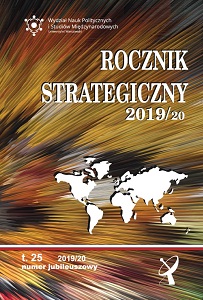
We kindly inform you that, as long as the subject affiliation of our 300.000+ articles is in progress, you might get unsufficient or no results on your third level or second level search. In this case, please broaden your search criteria.

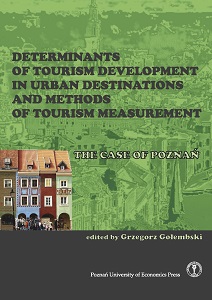
Competition at regional and local levels calls for solutions that will ensure a better success in meeting development goals of territorial units. Among major goals is the welfare of local communities. A category describing the sense of well-being of a group of citizens (e.g. inhabitants of a municipality, city, or region) is the quality of life which depends to some extent on the outcomes of economic activities in the area. Among many economic functions of a city is tourism. The relationship between quality of life and tourism development, however, is not straightforward as it depends on the complex city product and the role of local residents in its creation.
More...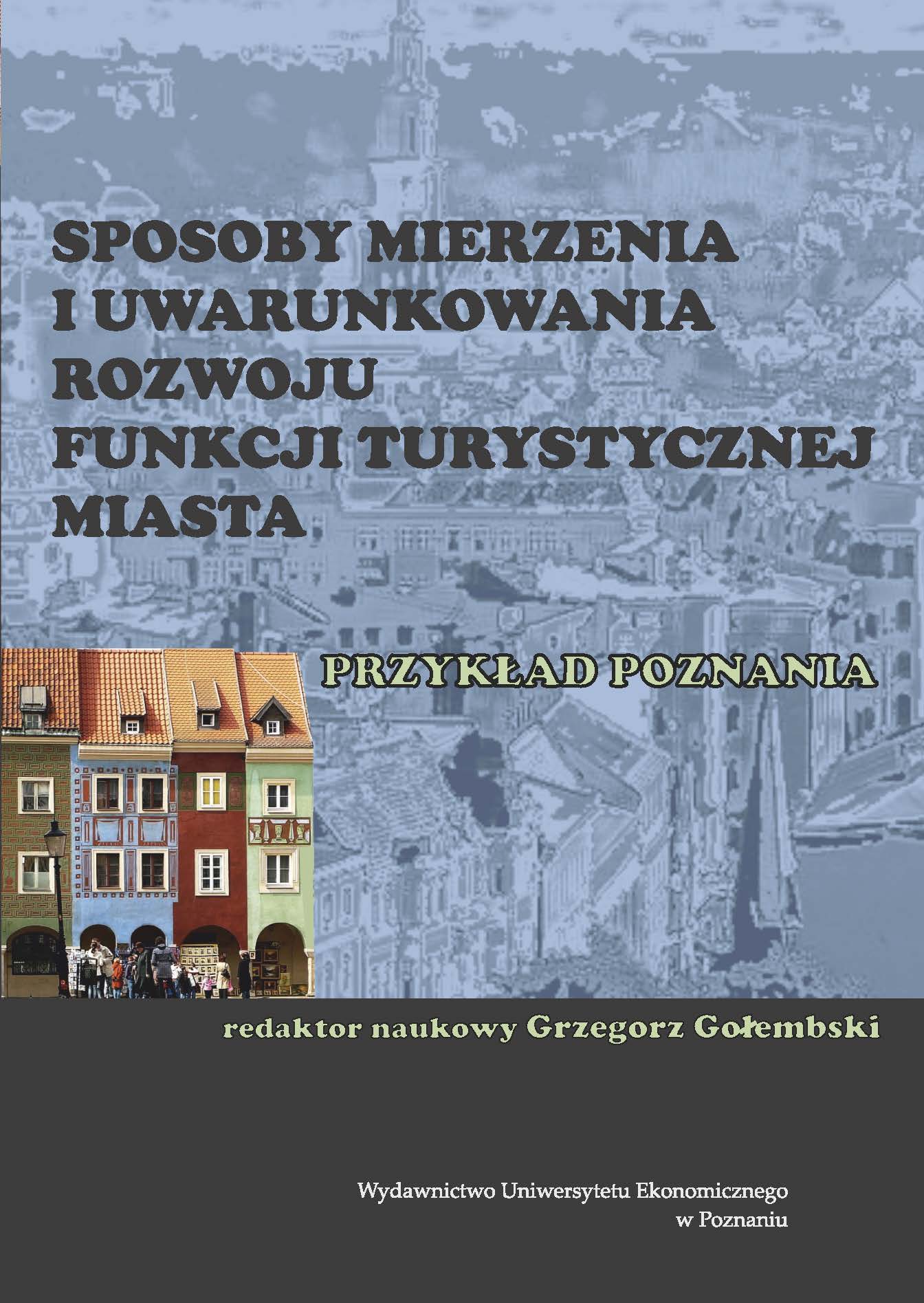
Celem artykułu jest określenie sposobu oceny oddziaływania władz miasta na rozwój turystyki, umożliwiającego wczesną diagnozę popełnionych błędów. Przy próbie osiągania tego celu musimy sformułować założenie: sposoby oddziaływania samorządu na rozwój turystyki uzależnione są od poziomu natężenia funkcji turystycznej miasta. Ponieważ jednostki samorządu terytorialnego zarządzają obszarami o różnym natężeniu i dynamice zmian poziomu natężenia funkcji turystycznej, nie pozostaje to bez wpływu na kształt prowadzonej przez nie lokalnej polityki turystycznej. Działania władz samorządowych skierowane na aktywizację lokalnej gospodarki turystycznej powinny być podejmowane w różnym zakresie i z różnym natężeniem w jednostkach o odmiennym stopniu ukształtowania funkcji turystycznej – zgodnie z różnymi potrzebami i celami w zakresie rozwijania turystyki na ich terenie. Oddziaływanie samorządu na rozwój turystyki dotyczy zarówno sfery popytu (oddziaływanie na klienta – wizerunek miasta, oferty „konsumpcyjne”), jak i sfery podaży (oddziaływanie na inwestorów i już funkcjonujące podmioty gospodarcze). Założenia te pozwolą określić pytanie badawcze, na które będziemy starali się odpowiedzieć, a mianowicie: znając poziom natężenia funkcji turystycznej miasta i tym samym fazę cyklu życia obszaru turystycznego, określić, w jaki sposób oceniać oddziaływanie samorządu na rozwój funkcji turystycznej dużego miasta. Innymi słowy, w jaki sposób władze samorządowe wykorzystują będące w ich dyspozycji instrumenty oddziaływania na turystykę. Możliwości oceny sposobu postępowania władz samorządowych dopatrujemy się w weryfikacji kompleksowej ankiety, która umożliwi zdiagnozowanie istniejącej rzeczywistości.
More...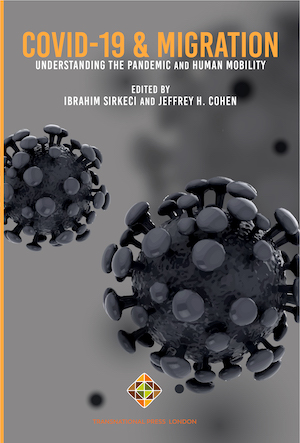
The worldwide spread of COVID-19 first reported from Wuhan in China is attributed to migration and mobility of people. This paper presents how our understanding of migration and livelihood could be helpful in designing a mitigating strategy of economic and social impact of COVID-19 in India. The paper concludes that there are many challenges migrants face during the spread of COVID-19 resulting from nation-wide lockdown. Many internal migrants faced problems such as lack of food, basic amenities, lack of health care, economic stress, lack of transportation facilities to return to their native places and lack of psychological support. On the other hand, COVID-19 has also brought into sharp focus the emigrants from India and the major migration corridors India shares with the world as well. Although state and central governments have adopted various strategies to deal with these issues, there is a huge uncertainty about how long this crisis will last and what damage it would do to the economy and livelihood of people. This paper further provides some immediate measures and long term strategies to be adopted by the government such as improving public distribution system, strengthening public health system, integration of migrants with development, decentralisation as a strategy to provide health services, and providing support to return migrants to reintegrate them, and alsostrengthen the database on migration and migrant households.
More...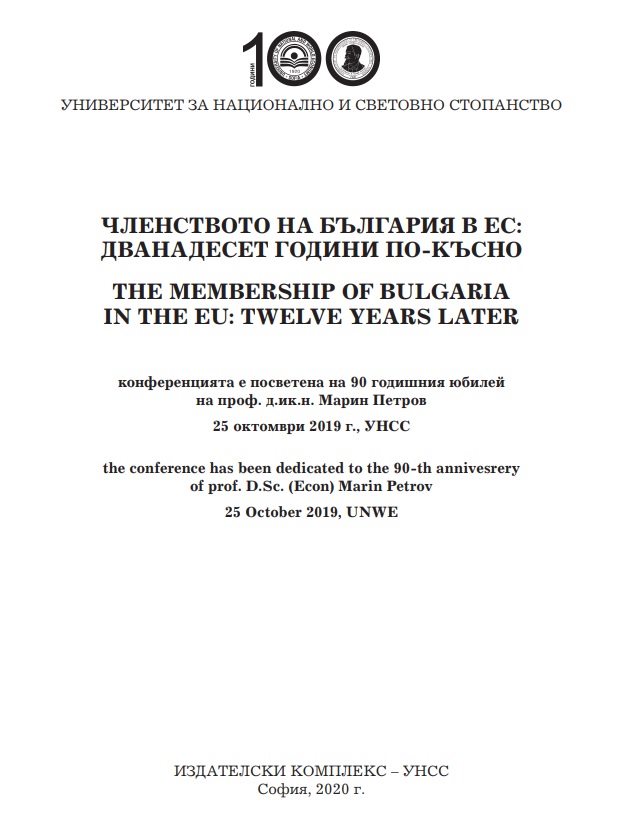
EU industry is funded by the European Regional Development Fund (ERDF) and it is a driver to the economic sustainability and competitiveness. The European priorities is to develop the economics sectors by technological and digital transformation and to increase competitiveness by internationalization and circular economy. The future cohesion policy (2021-2027) is aimed to boosting EU competitiveness through innovation, technological transformation, low-carbon economy and efficient use of natural resources. The growth of business activities is influenced by many factors, one of which is access for funding. The analysis focuses on the results of the Bulgarian program for innovation and competitiveness in terms of SMEs and industry development. The EU grant schemes have supported the technological modernization of the SMEs and start up innovative productions.
More...
The European Green Deal is the first multilateral strategy to ensure sustainable future for the entire EU. The Union intends to engage other countries and continents in commitment to the Paris agreement through expedient policy making, law engagement, leading by example and active diplomacy. EU has the potential to become a world leader in this continues process of energy, technological and economic transformation which would contribute to preserving the Earth and the mankind. The European Green Deal is vastly enveloping and transformative, it reaches beyond the frame of the pragmatic and technocratic solutions and, by necessity, transmutes itself into a philosophical problem.
More...
The report examines the natural and anthropogenic resources of Burgas Region for the development of health tourism. The following research objective has been set: to explore the potential of Burgas District for the development of health tourism. For a more precise analysis, the corresponding tasks were also set: to determine the specific therapeutic procedures to which the relevant contingents of tourists would be interested; to specify the ways of assistance from the tour operators for the development of health tourism in the region of Burgas. The study concluded that the current and potential users of the health tourism service have positive expectations about the development of health tourism in the Burgas region.
More...
This paper analyzes the economic growth in the euro area countries and interprets it in the context of the expenditure factors involved. In this context, the expenditure structure of the GDP and its dynamics in the periods before and after the last crisis is examined, the independent behavior of the individual expenditure components is commented, as well as their contribution to the achieved rates of economic growth. In this way, certain specific features between countries and groups of countries within the euro area are derived.
More...
The present paper provides an insight into shaping the EU‘s Digital Single Market – in terms of strategic pillars and priorities, as well as relevant national programmes and policies aimed at the digitalization of European enterprises. Via a comparative approach, a brief analysis of different measures and instruments – implemented by the member states and supporting the adoption of new technologies in line with the opportunities created by the rapidly expanding digital economy, has been also provided. As regards appropriate targeting (at macro, micro and sector levels), an important step would be to address areas that are crucial for the Industry 4.0 landscape. Bulgaria is lagging behind EU‘s best performers in this particular respect, despite the country‘s moderate assessment of available funding options and access to finance.
More...
This paper presents a brief review and analysis regarding the impact of the FIDIC Conditions of Contract and, in particular, the opportunities which they suggest in terms of efficient resource management and, generally, the projects in their two main aspects: adherence to established beforehand time schedule and project implementation up to a financial resource defined through negotiations between the dedicated national institutions and beneficiaries in the environmental protection field.
More...
The objective of the research is to present the importance of the European Green Deal for the European economy. The paper reviews in a greater detail as a subject the structure of the Green deal proposal and its mechanisms. The utilized research methodology includes content analysis, analysis of statistical, historical data, graphics, conclusions and generalizations. The hypothesis is that the European Green Deal presents tremendous opportunity for the EU to lead the global course towards climate neutral economy and decarbonization. Significant changes to the existing socio-economic structures would follow. In preparation for that, the EU engages significant amount of public fiscal resource in the long transition to climate neutrality till 2050. The strategic fundamentals of the European Green Deal are highlighted by the European Commission, yet further legal acts and binding policies shall be implemented so that measures and commitments are enforced with efficacy. It concludes that combination between already existing and new policy instruments are introduced.
More...
In recent years, the phenomenon of rehsoring has become increasingly popular. Interest in the return of activities is increasing, both among politicians and scholars, and is being debated as to whether the resourcing is an increasing trend, or part of the traditional strategic mix of companies that, through investment and investment, choose the optimal location for their activities. The study of the evolution, scale and motivation of the return of activities is becoming increasingly important for understanding the drivers behind this phenomenon and for promotion policies. This article outlines the reshoring phenomenon, provides an overview of terminology, and sets out an exemplary research framework to help those working in the field – scientists, policy makers, and more.
More...
In September 2015 all 193 Member states of the United Nations adopted the 2030 Agenda for Sustainable development outlining the path for the development of the world, each country, the business and the nongovernmental sector. The inclusion of the 17 Sustainable Development Goals in business management processes is a precondition for increasing the investments and the trust in companies. In this report, the author aims to examine the involvement of Bulgarian business in achieving the Sustainable Development Goals and its attitude towards including the 2030 Agenda in its „agenda“.
More...
The paper traces the relationship between the housing and the demographic policies in Bulgaria and analyzes how to actually stimulate young people to stay in Bulgaria by satisfying them housing needs. Accessibility to housing policy is key to improving demographics indicators and therefore it is required to apply integrated approach between the two policies.
More...
As of January 2007, the Instrument for Pre-Accession Assistance (IPA) replaces various EU instruments and programmes for pre-accession financing which had previously been functioning - PHARE, PHARE CBC, ISPA, SAPARD, CARDS and the financial instrument for Turkey. The aim of this article is to clarify the nature of the IPA which benefits Albania and the rest of the prospective candidate countries from the West Balkans in the past programming period (2007-2013) as well as the present one (2014-2020). The methodology of the research is based on content analysis – the content of fundamental EU strategic and legal documents was analysed as well as opinions expressed by both Albanian and Bulgarian academics in the field. The research results are conclusions about the way the IPA functions, the problems occurring in its course in Albania and recommendations for its continuation in the next programming period due to the importance of the economic sectors which are being financed through IPA in the countries from the Western Balkans region.
More...
The political and the institutional systems of the European Union (EC, the Union) are complicated system organized on many levels – regional, national and European. Many factors affect the organization and the functioning and the EC institutions. They face continuously in their work challenges and have to solve new arising problems in the current dynamic world. The normal work and the future development of EU as a unique political and economic organization of voluntarily joined European countries depends vastly on the institutional system abilities (capacity) to take on time efficient short-term and perspective decisions. In the present article we have tried to identify and to classify the most important challenges in the current development and the main factors – external (global) and internal, affecting the Union and as well as their complex effects and consequences.
More...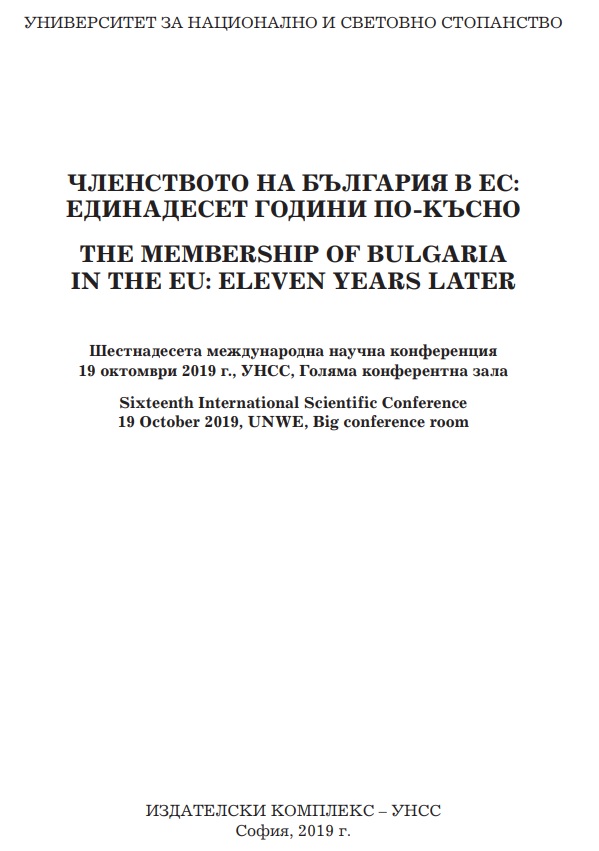
The article presents a relatively new direction, related to the understanding of the efficiency of marketing communications – the distinction between economic and non-economic efficiency. A thesis is supported, that discussions whether these activities should lead to sales or achieve other results do not have strong base, because the main point in these cases is the purchase that can be even postponed for the future. In this sense, measurement of the effectiveness in practice is important to be done based on indicators related both to economic and non-economic results.
More...
The paper is focused on identification of major features of project team management in a global multicultural environment related to the achievement of success of project portfolio management. A special emphasis is put on the interrelation between project portfolio management, organizational strategy, and effectiveness of project teams operating in a global multicultural environment. Various indications are provided regarding the behavioral aspects, multicultural competences, and virtual project teams’ management. Particular attention is devoted to the impacts of the cultural diversity on the management of multicultural project teams.
More...
The significant role of the external trade for an economy is incontestable. External trade not only helps to the capital accumulation for the industrialization of an economy but also generates employment. Furthermore, external trade which reflects the national production of an economy speeds up the transfer and the usage of the new technology and might increase the foreign exchange supply which is necessary for the balance of payments. Last but not least, external trade serves for enhancing political and diplomatic relations between countries. Along with the incontestable importance of increasing the volume of trade, trade composition and export diversification are as significant as the quantity for an economy. Classical trade theory as well as Heckscher-Ohlin theory that explain the gains from international trade by the static comparative advantage under perfect competition are far from conceiving today’s tangibles and the assumption of trade as an engine of growth deals with short-run economic growth. These weaknesses might be reinforced with a differentiation of trade composition and export diversification. Such a structural change on the external trade composition might then positively affect long-run economic growth. Regarding Turkey’s external trade, European Union has been the main trading partner of Turkey since the entering into force of the Association Agreement. The Association Agreement which aims the full membership of Turkey to the European Union foresees a Customs Union for industrial commodities. The Customs Union between the parties has been constructed upon three different stages, namely the Preparatory Stage, the Transitional Stage and the Final Stage. The Final Stage which reflects the readiness of the parties for the well-functioning of the Customs Union started in 1996. The aim of this paper is to analyse the changes in the composition of trade between Turkey and the main European Union trading partners and to evaluate the changes by taking into consider 1996 and 2017. The conclusions of this paper would give us the opportunity to discuss the actual as well as potential trade composition and export diversification of Turkey at the Final Stage of the Customs Union and might lead to further studies which examine the relationship between export diversification and long-run economic growth.
More...
Urban mobility is changing in the most cities in the developed world. More importantly, these changes are no longer related to the continuation of past trends, such as the significant increase in motorization in the second half of the 20th century. Instead, cities are increasingly seeing the impact of more destructive changes, whether as a result of technological innovation, socio-economic change or new political interventions. The significant and unexpected growth of urban bicycling; the growing importance of the car- and bicycle sharing; multimodal travel supported by smartphone travel applications; and rediscovery of walking in urban conditions are not only the common experiences in many cities, but they have become the main focus of the urban transport policy in the cities around the world. This study aims to address the issues of the sustainable mobility, how and via which policies and incentives will be realized and what are the challenges the automotive companies are facing. The methodology used for the study conduct is an analysis of primary and secondary information, a review of researches by leading consultancy companies, opinions and researches of the European institutions, and a regulatory framework to clarify the problems and opportunities for mobility. In order to solve the connectivity, safety and environmental issues, the automotive industry should work with other industries, institutions, NGOs etc.
More...